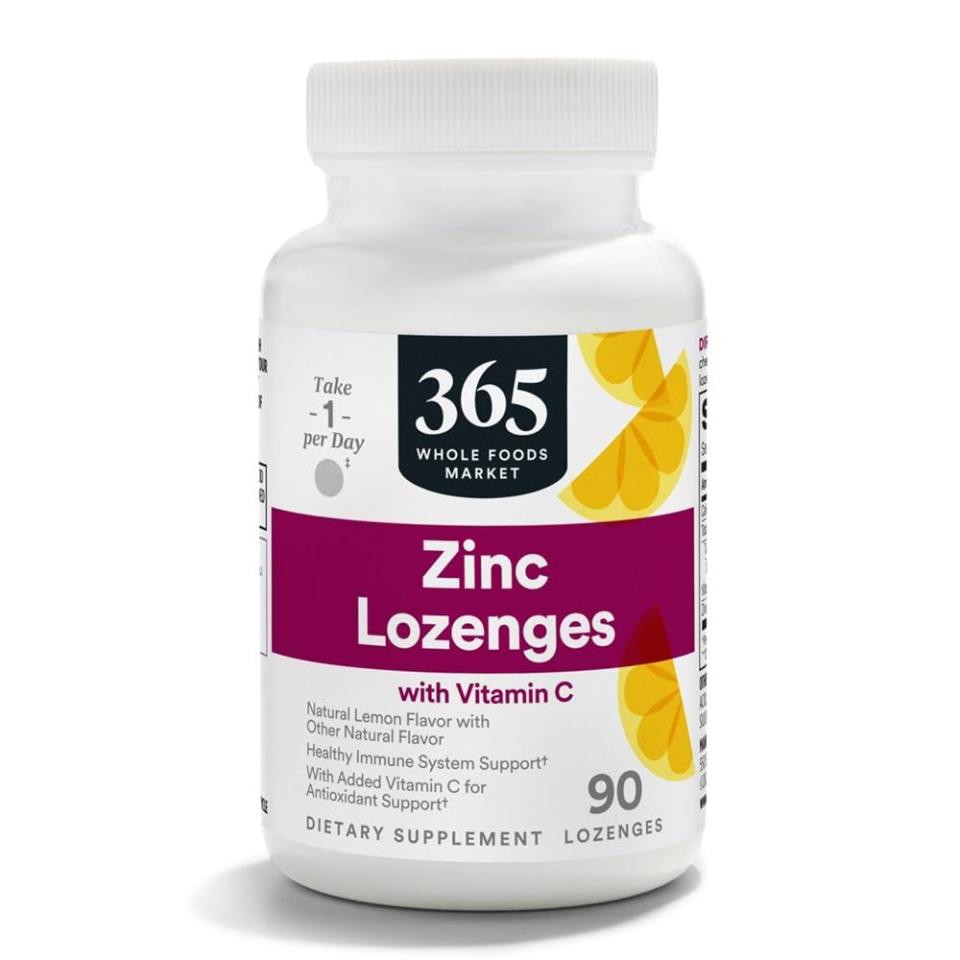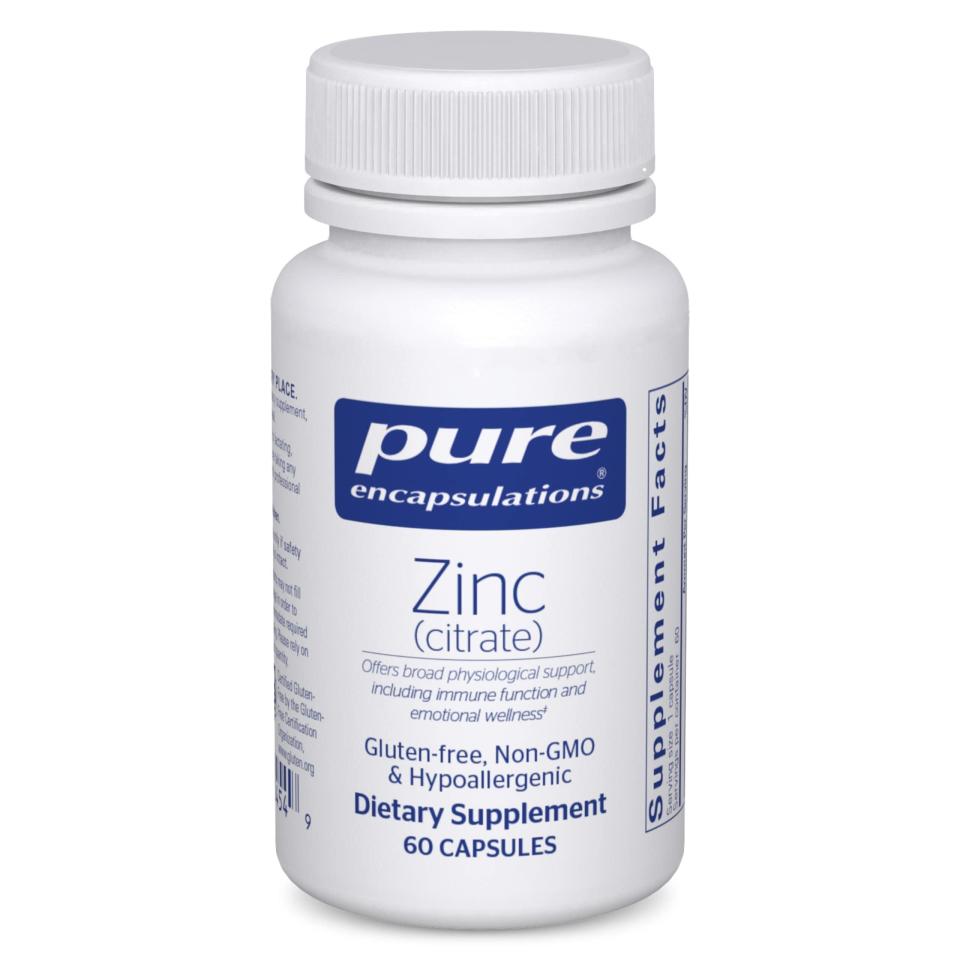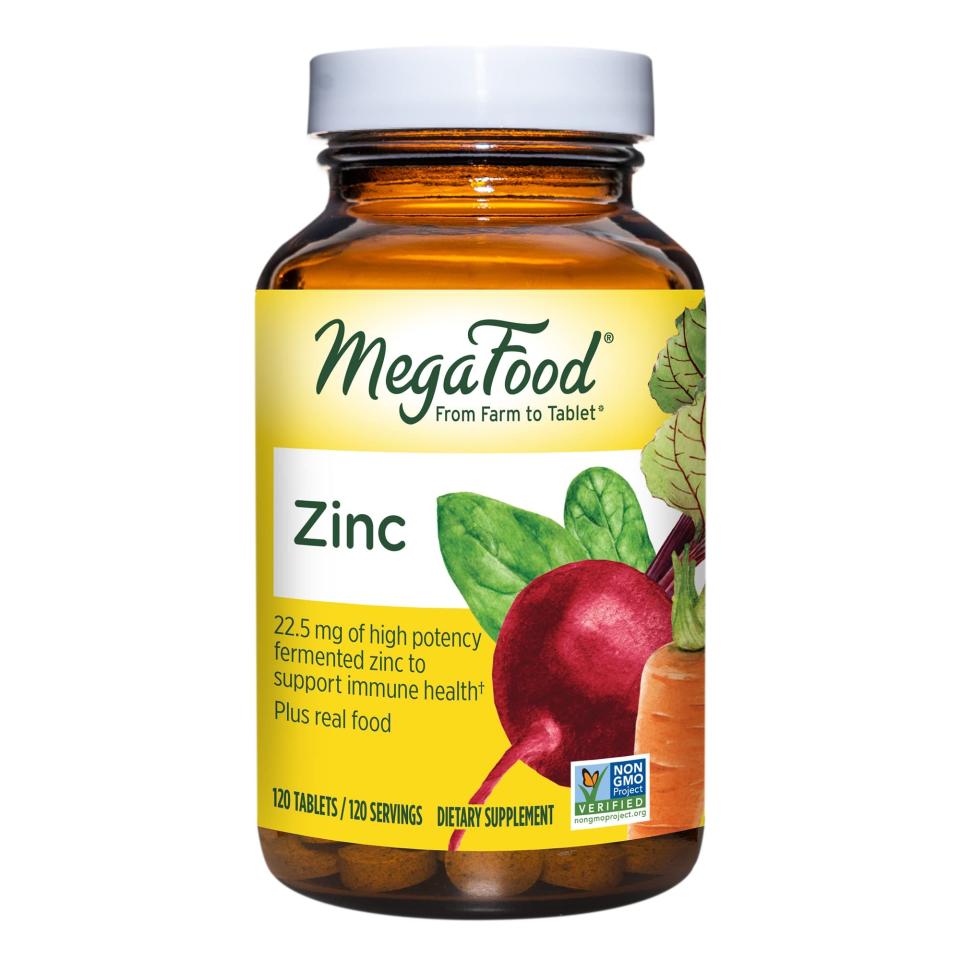Here's The Best Time To Take Zinc If You're Trying To Shorten A Cold
"Hearst Magazines and Yahoo may earn commission or revenue on some items through these links."
Zinc has been around as a supplement for ages. But the trace mineral really took off during the pandemic when researchers discovered that many people hospitalized with COVID-19 were deficient in zinc.
Zinc actually plays an important role in immune function, and it pops up a lot in lozenge form as a way to purportedly shorten your colds (more on that in a sec). Given that we’re diving straight into cold, flu, RSV, and COVID season—whew—it’s understandable to want to do what you can to make sure your immune system is in peak condition. Cue the questions about zinc.
It's important to curb your expectations with zinc—it’s not going to turn you into germ Teflon or anything, says Angela U. Tucker, MD, clinical assistant professor of Family Medicine at The Ohio State University Wexner Medical Center. But there is some data to support its use for a range of things that have to do with your health.
Of course, if you’re taking zinc, you’ll want to do what you can to max out its benefits. So, when is the best time to take zinc and what can this supplement even do? Here’s the deal.
Meet the experts: Angela U. Tucker, MD, is a clinical assistant professor of Family Medicine at The Ohio State University Wexner Medical Center.
Jessica Cording, RD, is a nutritionist and the author of The Little Book of Game-Changers.
Vijaya Surampudi, MD, is a professor of internal medicine at UCLA Health.
What is zinc?
Zinc is a nutrient that you need to stay healthy and it’s found in cells throughout your body, the National Institutes of Health (NIH) explains. Zinc helps your immune system fight off bacteria and viruses, and make DNA and proteins.
“Zinc can also help with the healing process in people with long-term wounds or ulcers,” Dr. Tucker says. But she points out that the most well-researched perk of zinc use is that it shows potential to shorten the duration of colds.
And, having adequate levels of zinc in the body is linked to falling asleep faster and having better sleep quality, research has found.
Average daily recommended amounts of zinc vary by person and what's happening in your life, but most adult women need 8 to 12 milligrams of zinc daily while most adult men need 11 milligrams, per the NIH.
Food Sources Of Zinc
Most food sources of zinc are from meats, says Jessica Cording, RD, a nutritionist and the author of The Little Book of Game-Changers. “Meat, fish, and oysters are the best sources,” she says. “There are some plant sources, like pumpkin seeds and lentils, but there’s not a lot of zinc in fruits and vegetables.” Worth noting, per Cording: You can also get zinc from some fortified breakfast cereals.
“Most people in the United States get enough zinc from the foods they eat and do not need daily supplementation,” says Vijaya Surampudi, MD, a professor of internal medicine at UCLA Health. But she says some people may benefit from zinc supplements under the care of a doctor. Those can include:
People who have digestive disorders like celiac disease, ulcerative colitis or Crohn’s disease
Vegetarians and vegans (since the majority of the their protein sources are plant-based)
Alcoholics (alcoholic beverages decrease the amount of zinc the body absorbs)
Some people may also see the perks of taking zinc lozenges when they have a cold, given that it can shorten how long they’re sick, Dr. Tucker says.
There are different types of zinc, including zinc sulfate, zinc acetate, and zinc gluconate, but the NIH says it’s not clear which form is better than others.
Wondering if you're deficient in zinc? There are few signs to consider, including the following, according to the NIH:
Loss of taste and smell
Delayed wound healing
Issues with thinking, reasoning, and memory
Risks And Contraindications Of Zinc Supplements
“In general, zinc is considered a low-risk supplement,” Dr. Tucker says. However, taking zinc intranasally (like, up your nose) isn’t recommended because it’s linked with a loss of taste and smell, she says.
You may also experience things like indigestion, heartburn, headaches, nausea, vomiting, fatigue, or weakness on zinc, Dr. Tucker says. Also, keep this in mind, per the NIH: Having too much zinc for too long a time could actually lower your immunity, along with levels of HDL (“good”) cholesterol, and your copper levels.
“In general, though, it’s thought to be a very safe supplement,” Dr. Tucker says.
The Best Time To Take Zinc
The timing of when you take zinc doesn’t really matter, Cording says. If you notice that your zinc supplement makes you feel nauseous after you take it on an empty stomach, she suggests having yours with a meal.
Doing so may have an added benefit as zinc is best absorbed when taken with protein, Mount Sinai notes. So, perhaps taking your zinc with a high-protein breakfast is a solid choice. “In general, though, there’s no gold standard for when to take zinc,” Cording reiterates.
Interested in trying zinc for yourself? Cording suggests looking for products with third-party testing to ensure quality control. Also, check in with your doctor—then consider these supplements.
Zinc Lozenges with Vitamin C
These lozenges have a light lemon flavor and are designed to be taken when you feel a cold coming on. Each contains 23 milligrams of zinc, along with 100 milligrams of vitamin C.

Zinc Lozenges with Vitamin C
amazon.com
$9.49
Whole Foods MarketZinc (Citrate) | Supplement
Cording says the brand does an “excellent job” of quality control. These supplements contain 30 milligrams of zinc and are free of gluten, artificial colors and sweeteners, and GMOs, among other things.

Zinc (Citrate) | Supplement
amazon.com
$11.60
Pure EncapsulationsZinc
Cording also gives MegaFood the thumbs up for its quality control and third-party testing. This supplement is free of nine allergens—milk, eggs, peanuts, tree nuts, soy, wheat, fish, shellfish, and sesame—and is certified kosher. It contains 22.5 milligrams of zinc per serving.

Zinc
amazon.com
$27.99
MegaFoodHow often can you take zinc?
It depends, and this is where you really should consult your doctor. Needs can vary based on what’s going on in your life and you may need more than usual under some circumstances, Cording says.
“If you’re taking a low dose, like in a multivitamin, it’s safe to take zinc every day, especially if you’re not getting huge quantities in your daily eating pattern,” Cording says. “But I wouldn’t take mega-doses for more than two weeks unless prescribed by a doctor.”
What’s the max dosage that’s safe to take?
Again, it depends on your individual circumstances. In general, though, it’s not recommended that most people exceed 40 milligrams of zinc a day.
What should you do if you miss a dose?
You don’t need to double up or anything. Cording says it’s “no big deal” if you miss a dose. “Just take it the next day,” she says.
How should you store zinc supplements?
It’s always important to read the packaging for your particular zinc supplement. However, Cording suggests keeping your zinc in a cool, dark place, like your medicine cabinet.
Bottom line: Zinc can be a helpful supplement to take in limited doses under certain circumstances, like if you recently had surgery or are battling a cold. Just talk to your doctor before putting yourself on a supplement to make sure it’s right for you.
You Might Also Like

